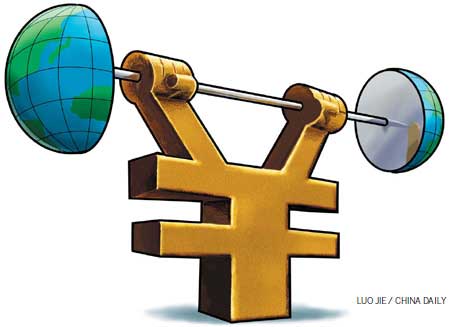

The financial support that China's central bank has offered the pilot free trade zone in Shanghai represents not only the latest evidence of the resolution of the government to implement a sweeping plan to overhaul the world's second-largest economy.
It is also a needed response to the accelerated internationalization of the Chinese currency. It was reported that renminbi has surpassed the euro as the second-most used currency for trade finance by value.
The People's Bank of China issued a guideline on Monday to ease the way for foreign investment in the free trade zone in Shanghai and allow Chinese residents to use the zone as a base for investment overseas.

For observers who were disappointed by lack of specifics when the free trade zone was launched in late September, the blueprint from the central bank will help shore up their confidence in the zone as a testing ground for reforms.
Though international trade and foreign direct investment have long been welcome as a driving force behind China's economic growth, the government has limited the flow of funds for financial investments into and out of the country, partly from fears of the havoc it might cause at the time of the financial crisis.
Yet, to better integrate China into the global economy while facilitating economic transformation at home, the country's leaders have recognized the increasing necessity of financial liberalization. And that explains why the Shanghai free trade zone has pledged to push for "a full-scale opening" of the financial service sector to eligible private investors and foreign financial institutions.
Given the complexity of China's necessary financial reforms which range from the marketization of interest rates to further reforms on foreign currency management, the new guideline highlights a testing and liberalizing step-by-step approach.
But as the cross-border use of renminbi is more popular than expected, Chinese policymakers should not hesitate to set in motion inevitable financial reforms.
 Model with German luxury cars
Model with German luxury cars
 Getting in the mood
Getting in the mood
 Models at Mercedes pavilion at 2013 Auto Guangzhou
Models at Mercedes pavilion at 2013 Auto Guangzhou
 Buick Riviera concept car at 2013 Auto Guangzhou
Buick Riviera concept car at 2013 Auto Guangzhou
 FAW-VW all-new Golf at Guangzhou auto show
FAW-VW all-new Golf at Guangzhou auto show
 VW donates more than 5k child safety seats
VW donates more than 5k child safety seats
 Honda models at 2013 Guangzhou auto show
Honda models at 2013 Guangzhou auto show
 Honda Jade at the 2013 Guangzhou auto show
Honda Jade at the 2013 Guangzhou auto show